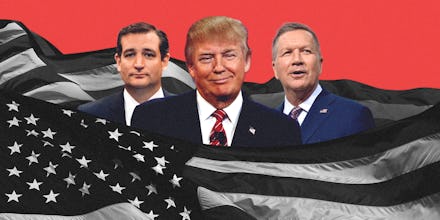2016 Indiana Republican Primary: Donald Trump Overcomes Ted Cruz Again

And Indiana makes seven.
Republican presidential frontrunner Donald Trump dealt a body blow to Ted Cruz's Oval Office dreams Tuesday, scoring his seventh consecutive primary victory, this time in the Hoosier State.
The Associated Press called the race for Trump at 7 p.m. Eastern, when the final polls closed.
Trump was to take his victory lap at his self-named Manhattan headquarters after vanquishing Cruz in a state the Texas senator badly needed to win to jumpstart his campaign.
Cruz picked up the support of Indiana Gov. Mike Pence ahead of the vote, and sought to invigorate his base and draw new followers by choosing former Hewlett-Packard CEO and erstwhile presidential rival Carly Fiorina as his running mate.
But even in a state with a notable population of evangelical Christians who might be attracted to Cruz's Scripture-laced pitch, Trump showed up with a 10-point advantage in the polls.
Equipped with the endorsement of legendary basketball coach Bobby Knight, Trump built on the momentum he'd gathered from a landslide victory in the New York GOP primary on April 19 and a sweep one week later of the so-called "Acela primary," encompassing contests in five Northeastern states.
On the eve of the Indiana contest, with 57 delegates at stake, Trump had already accumulated 996 of the 1,237 convention delegates he needs for the nomination.
Per RealClearPolitics running totals, Cruz had 565 and Ohio Gov. John Kasich had secured 153.
The last day of campaigning in Indiana saw Cruz unleash a searing attack on Trump as everything from a "pathological liar" to a "serial philanderer," essentially pleading with Indiana voters to reject The Donald as unfit for office.
Trump's campaign issued a withering response that described Cruz as increasingly "unhinged" and lacking presidential temperament.
The Republican primary cycle continues until June 7, with the big prize being California and its 172 delegates.
Cruz and Kasich, who entered into a deal that was supposed to clear the way for Cruz in Indiana while Kasich focused on Oregon and New Mexico, have both argued that they can sway enough voters at a contested GOP convention in July to claim the nomination.
After another Trump win, they may both have some thinking to do.